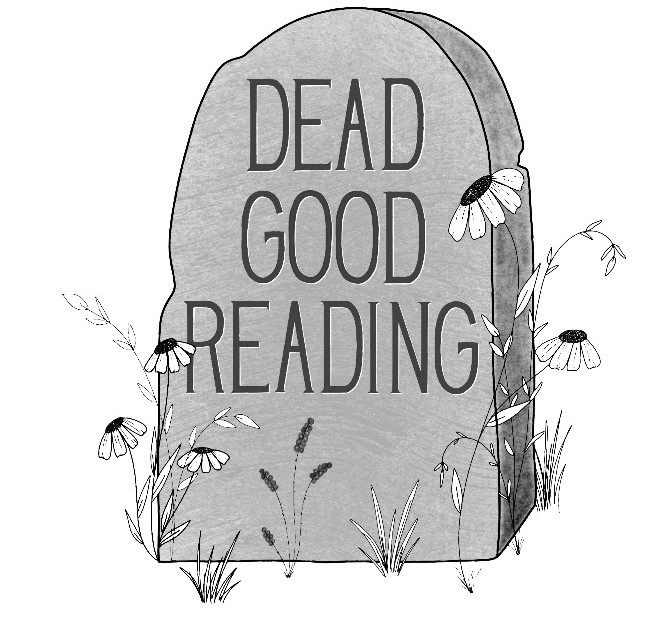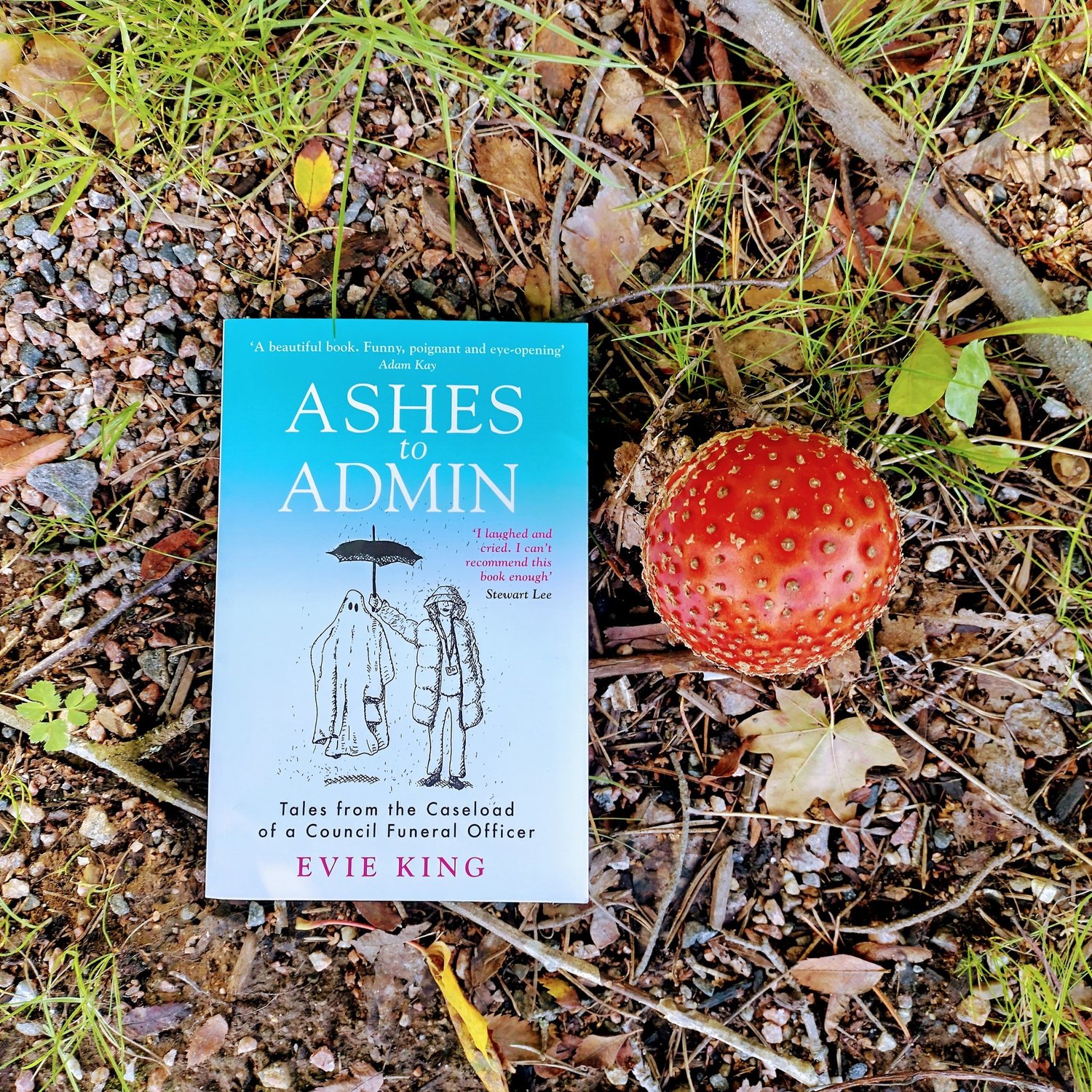I just finished the pages of Evie King’s Ashes To Admin: Tales from the Caseload of a Council Funeral Officer for a second time this year. I read it earlier this year in preparation for a Dead Good Conversation with the author.
I occasionally organise online conversations with authors, and the one with Evie was particularly lovely with a wonderfully engaged audience. But as this conversation occurred in April, I had to refresh my memory to actually sit down and write a little bit about the book (I write this as if it was punishment, and not a little treat to be in her world again).
For the Dead Good Conversation, one audience member emailed a question beforehand:
“In your book you said “there are so many death certificates out there with my name on and giving my relationship to the deceased as “causing the body to be burned/buried”…”. What I would like to know is if you were contacted now by a relative of one of these people whose certificates have your name on, who hadn’t known of their death at the time, would you be able to tell them where the final resting place of their family member is or at least be able to tell them how to go about accessing the information?
I am asking because my dad was estranged from his sister, my aunt, who I never met. He had wanted to see her again when he was dying but I didn’t know how to find her. However, last year I discovered she had passed away early in 2022 and so sent for her death certificate. Sadly it contains similar words, “causing the body to be cremated” and I suspect the person who did that may have a similar role to yourself. I would like to know where my aunt’s final resting place is. I have this slight concern of what if her ashes are unclaimed somewhere. I just want to know she’s been laid to rest properly somewhere and to feel she is at peace. It isn’t your name on the certificate but I thought you may be able to advise/help me”
On the night I posed this excellent question to Evie, and afterwards, with both parties permission, I exchanged their email addresses. A week later I received this message from Evie:
Hey. An update on [name], who you put in touch with me. I got a response from the person on the death cert and got a response with the exact location of the scattering, along with a full eulogy! Thought you would want to know x.
I thus experienced first-hand the magic of the work that Evie King does. Evie King works for her local council and part of her job is to carry out funerals under Section 46. It is not a given that there are people available to organise a funeral after someone dies, but legally in the UK councils are responsible when no-one is available. People are not just thrown in a ditch and forgotten.
Not everyone who has their funeral carried out under Section 46 is alone or estranged, There will also be individuals with next of kin to mourn them, but who are unable to bear the costs of the arrangements due to financial hardship and the rising price of funerals.
Evie King (2023, page 14).
Ashes to Admin tells the story of how Evie became a Council Funeral Officer. The book describes the range of cases of people who might be buried on Section 46. Evie goes above and beyond to uncover clues about the people whose case land on her desk, and she has elevated a stuffy admin job into something meaningful and profound. The email-question mentioned above is but one example of how Evie works her magic.
As is noted by radical undertaker Ru Callender in What Remains?, the UK funeral industry can be a expensive minefield. Ashes to Admin shows the consequences of the costly world of funerals. To be responsible for a funeral increasingly can cause people to get into debt. Funeral poverty is a growing issue, and can be one of the reasons why people will receive a Section 46 funeral; families can simply not afford it. A huge amount of shame comes with not being able to give family member a ‘proper’ send off.
Another reason why people might be buried under Section 46 is the fact that human relationships and human life is complicated. Some people choose to live very secluded lives, others will lose touch for a myriad of reasons. For those interested, The Death Studies Podcast episode with Dr Kate Woodthorpe gives some insight into how complicated families are, particularly at the end of life but also in death. Woodthorpe notes how death is a relational issue and therefore terribly complex. In the episode, Woodthorpe reflects on blended families and how the death of her father-in-law challenged her to reflect on what her role was and whether she should be responsible for certain things, like the funeral. Who are the ‘key people’ in death? And who should be doing what?
Another criticism put forward by Woodthorpe is the notion of ‘loved ones’ – not everyone is loved and not everyone is on good terms with their so-called ‘loved ones’. This challenge is also present in Ashes to Admin, some people fall under Section 46 because they have fallen out with their ‘loved ones’.
In Ashes to Admin, Evie shows, however, that very few people aren’t loved, but that mourners can take various shapes. The effect of people’s deaths can ripple far beyond the stereotypical expectation of family:
“As we drove away I thought about all of the atypical types of grief and mourner I had come across so far, so different from the pre-conceived familial norms. Care home staff, neighbours, garden club members, local bus drivers. There were a thousand ways to be mourned, the benchmark didn’t have to be weeping spouses or devastated children”
Evie King (2023, page 133)
Evie King also struggles with her role and emotions in all of this. What is she supposed to feel, or not, in relation to the people she is organising funerals for? With every death some sort of relationship is formed, and some cases, like the burial of someone with learning difficulties, hit closer to home than others.
Ashes to Admin shows how precarious life and death can be. In a gentle and funny tone Evie King highlights both the bureaucracy and the humanity that is behind funerals organised under Section 46.
Evie King is the pen name of Christina Martin. She is a former stand up comedian and a part-time writer. She has always written short form pieces, in the margins of her various day jobs, contributing to New Humanist, Guardian Comment is Free, BBC Comedy and Viz Comic. Since moving to the seaside and going part-time she has had more time for writing which has accumulated in Ashes to Admin.


Leave a Reply